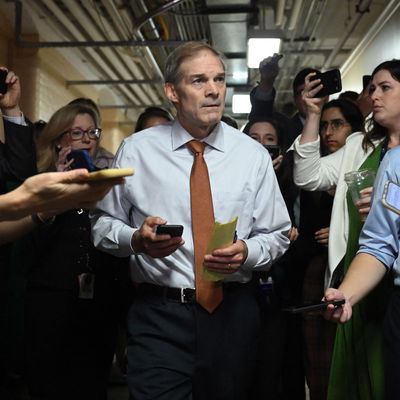
At the moment, the U.S. House of Representatives is a dysfunctional institution, reflecting the systemic problems of the Republican majority that loosely controls the chamber. Following the ejection of House Speaker Kevin McCarthy, the chair is occupied by a virtually powerless Speaker pro tem, Patrick McHenry. House Majority Leader Steve Scalise and Judiciary Committee chairman Jim Jordan are locked in a complex fight for the gavel, and House Republicans dare not go to the floor with a Speaker’s nominee without absolutely locking down 218 votes. There’s no telling how long that might take.
This congressional gridlock means four streams of government funding are in limbo, though large portions of Congress consider them extremely urgent: aid to Ukraine (a priority for Democrats and Senate Republicans), border security funding (a top concern for Republicans and some Democrats), federal government operations (key for Democrats and many Republicans), and now emergency aid to Israel.
This fourth congressional spending priority, made pressing by the newly deadly Hamas-Israel conflict, unites virtually all Republicans with a solid majority of Democrats (backed by the Biden administration). Indeed, the very MAGA House Republicans allegedly skeptical of overseas U.S. commitments are among the most vociferous backers of maximum aid to Israel. This is true not only when the Jewish state is besieged, as it is right now, but even when it is belligerently expansionist without provocation, thanks to conservative Evangelical convictions about a Greater Israel and a Middle Eastern regional war being essential to the second coming of Jesus Christ.
What makes the current paralysis of the House so dicey in terms of securing emergency funding for any of these four priorities is that the strongest supporters of aid to Israel and new spending on border security are the most likely opponents of aid to Ukraine and of keeping the federal government operating past the current November 17 deadline for expiration of the stopgap spending deal that brought McCarthy down. So the emerging Democrat strategy of tying together aid to Ukraine and Israel and the federal government is going to create particularly intense fissures among House Republicans that could play into the battle for the Speaker’s gavel. And again, without a Speaker, the House won’t be funding anything new.
As David Dayen explains at The American Prospect, the suddenly intense aid-to-Israel mandate that theoretically unites most members of Congress across party lines is more likely to become another partisan issue on which contenders for Speaker will have to show their willingness to fight:
The right is already desperate to portray Hamas’s sneak attack and incursion into Israel as somehow Joe Biden’s fault (inside Israel, the blame is being placed pretty squarely on Benjamin Netanyahu). They would be all too ready to condemn Democrats for risking the “loss” of Israel (regardless of the veracity of that claim) by trying to stuff Ukraine or government funding into a package. Israel becomes one more variable, no matter how must-have. It could just amp up the polarization and harden positions. …
Jordan, armed with Donald Trump’s endorsement (as well as some McCarthy allies who are wary of Scalise), has said that Israel would be his top priority, implicitly vowing to separate that from government or Ukraine funding. Scalise has also expressed Israel support, without explicitly saying that a resolution would top his list of priorities.
There’s likely to be a pretty extensive overlap between support for Jordan in the Speaker’s race and a hell-yes/hell-no position on funding for Israel and Ukraine, respectively. But this MAGA-adjacent faction has a rhetorical problem: Its main argument against continued aid to Ukraine is that any spare money should be spent on the southern border of the United States. Israel is not on the southern border, and the implicit “we need war in the Middle East to bring about the end of the world” argument that is so powerful among certain Republican base voters is deemed insane by most non-Evangelicals. So Team MAGA, and possibly Jim Jordan, may be tempted to push for an Israel/border-security funding package at the expense of Ukraine and federal government operations. Forcing this particular combo meal on the Senate and the White House is, of course, just as problematic as Democratic plans to force Ukraine aid and federal government operations on House Republicans.
Some House Republicans fearful of an extended battle over the Speakership are playing with the idea of resolving some fundings issues separately, as Punchbowl News reports:
Rep. David Joyce (R-Ohio), whose moderate RG2 group will host both Jordan and Scalise today, suggested in an interview that Republicans should somehow change the rules to empower McHenry as speaker to ensure that Israel and America’s other allies get the help they need.
House Republican opponents of linking aid to Israel to anything other than border security funding are very likely to shoot that idea down.
So you can expect more and more confusing arguments over congressional funding priorities to arise in the coming weeks as pressure increases from supporters of these various causes. And there’s no guarantee at all that the formula that gives someone — Jordan, Scalise, some dark-horse candidate, or even a revivified Kevin McCarthy — the Speaker’s gavel will be consistent with breaking the larger deadlock between Republicans and Democrats on nearly everything.
More on the israel-hamas war
- A Year After October 7, Israelis Ask, ‘Where Is the State?’
- ‘It’s Really Hard to Hold On in This Reality’
- How Israelis Are Feeling One Year After October 7






























